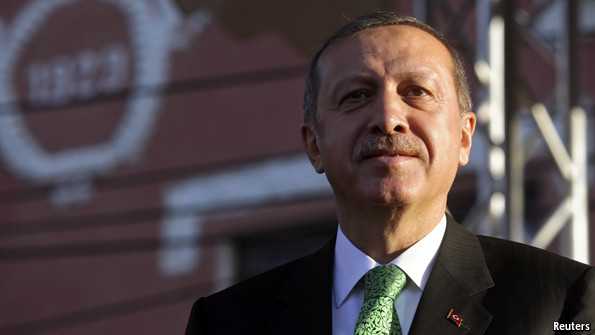AFTER eleven years of uninterrupted power is Turkey’s ruling Justice and Development (AK) finally beginning to unravel? Questions about AK’s future have been growing louder ever since Bulent Arinc, a deputy prime minister and government spokesman, aired his grievances against the prime minister, Recep Tayyip Erdogan (pictured), on the state-run TRT Turk news channel last week. He even hinted that if he wasn’t offered an apology he might resign.

The row was prompted by Mr Erdogan’s plans to restrict co-ed cohabitation among students who rent privately owned flats. The story was leaked by Zaman, a newspaper that is closely affiliated with a powerful Islamic cleric, Fethullah Gulen, a former Erdogan ally, who many say has now turned into his most formidable foe. Mr Arinc swiftly denounced the news as “a fabrication” only to be contradicted by Mr Erdogan the next day. Mr Erdogan declared that it was AK’s duty as a “conservative and democratic party” to take such measures prompting howls of protest from students and parents alike. Mr Arinc was glaringly absent from AK’s parliamentary group meeting on November 12th where Mr Erdogan said their differences “would be sorted out within the party”.
Mr Erdogan’s moral policing may help to quell rumbles within his pious base over AK’s perceived tilt towards profit and greed. In Topcu, a remote village on the Syrian border, Mahmut Isik Akdogan, a feudal landowner, said: “For decades our family did not send its girls to high school, let alone university, because we worried about them mingling with boys.”
Yet, it also goes to the heart of the mass anti-government protests that erupted in June. Mr Erdogan’s rants against abortion and calls for women to have at least three children if not five, have mobilised Turkey’s apolitical youth. Defiant teenagers began uploading videos of themselves on Twitter, while police began raiding apartments inhabited by unmarried boys and girls. And what of unmarried boys living with other boys?” some asked. The interior minister’s attempts to diffuse the crisis with claims that co-ed housing was used as “a recruitment ground for terrorists” didn’t help. The number of citizens visiting Ataturk’s tomb on the 75th anniversary of his death on November 10th hit a record of more than a million amid renewed panic over the future of the secular republic he founded 90 years ago.
Mr Arinc’s outburst reflects his party’s growing discomfort with Mr Erdogan’s incendiary rhetoric. None dare to say so but they are weary of his imperious ways. Might Mr Arinc resign? And how will this affect Mr Erdogan’s plans to become the country’s first elected president when Abdullah Gul steps down in 2014? Turkey’s hapless opposition leaders, who have yet to dent AK’s popularity, are bursting to know. Their glee may yet prove premature. Mr Arinc was said to have accepted Mr Erdogan’s invitation to accompany him to the mainly Kurdish city of Diyarbakir on November 16th for a mass wedding for low income citizens sponsored by AK.
Under AK’s internal rules any member who has served three consecutive terms in the parliament is no longer eligible to run. Mr Arinc, and around 70 other AK deputies, including Mr Erdogan, fall under this category. This may explain Mr Arinc’s bravado. It is certainly why Mr Erdogan wants to move upstairs. But he also wants to continue to control AK. The current constitution stands in the way. Mr Erdogan’s attempts to boost the powers of the presidency have failed. As president, his sole hope of dictating candidates’ lists for the 2015 parliamentary elections is to anoint a pliant successor. This so called “remote control” formula embraced by past presidents, Turgut Ozal and Suleyman Demirel, proved disastrous. Their parties were wiped away. The lesson has not been lost on AK. Many want Mr Gul, a globally popular former foreign minister, who is lauded for his easy style, yet is no pushover, to swap seats with Mr Erdogan.
Opinion polls suggest that Mr Gul would beat Mr Erdogan if he decides to run for a second presidential term. This, in turn, means that Mr Erdogan may be forced to hand him the premiership to prevent him from doing so. AK’s showing in the March 2014 municipal elections could prove decisive. Mr Gulen is expected to instruct his flock to vote for whoever is AK’s strongest opponent in a given district. Either way, there is no denying that Mr Erdogan is the most influential and successful leader in Turkey’s recent history. Yet he may well be remembered as one of the most intolerant and polarising as well.
Amberin Zaman
14 November 2013
Source: economist.com
